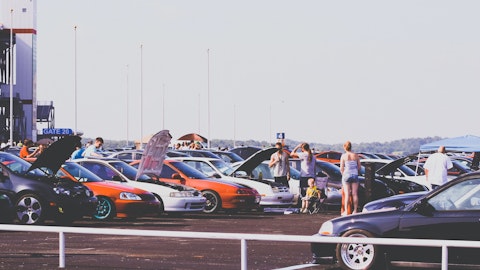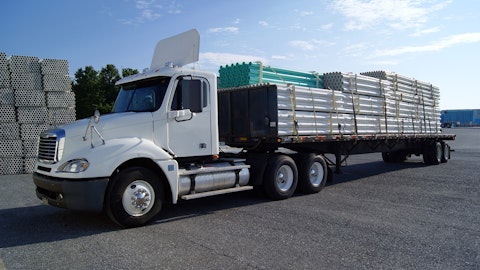And there’s some seasonality in there — here and there. But overall, we think we will ultimately get to that low 70% range.
Tony Facione: Some of that personnel cost was related to some of the vehicles that couldn’t be delivered that Randall spoke to earlier.
Shelley Hulgrave: Yeah.
Roger Penske: That’s why gross was down.
Tony Facione: Correct.
Roger Penske: But probably say, 4 million or 5 million of gross that we didn’t get. We are up 3 million growth for the quarter year-over-year, where we lost 4 or 5 in that one, and then, of course, we had a higher cost. The only thing we have really talked about with the hailstorm.
Tony Facione: Right.
Roger Penske: And there’s other little things in there where we just don’t talk about at this point.
Rajat Gupta: Got it. That’s clear. And then just in the U.K., any updated learnings from the Mercedes agency model. Looks like the GPU actually went up sequentially there from 2Q to 3Q. What drove that? Any other learnings you can share on profitability, SG&A changes, et cetera?
Roger Penske: Yeah. Talk about…
Tony Facione: Yeah. Sure. Yes. You are right, Rajat, the gross profit has gone up, and again, with a fixed commission, that’s going to be predicated on the sell price of the car. So we were at 3,278, so £3,278 per unit, which was up, if I look at 2019, it was £2,595 pounds per unit. Interestingly, in the acquisition we made about a year ago, the London stores, that’s at £3,564 per unit. So you get that richer mix of car. Obviously, we get the benefit from that. So our challenge and what the team has done a nice job and continues to do is we just got to reduce our cost base as we have a bit of a paradigm shift in how the customers transact. You see the traffic — foot traffic into the stores down, but our digital, our Internet traffic is way up.
So it’s really trying to convert and we have improved our conversion ratio on those leads by 8 points year-to-date compared to last year. So that’s the kind of stuff we are working on. We see service and parts continue to be strong there and grow. So look — those margins are good. We just got to continue to work on those costs underneath and drive those opportunities to the store both digitally and walking in.
Roger Penske: I think the good news here is that, we were the first guys in the barrel with agency. We are shifting to more product specialists than salespeople, which lower our cost. We are getting a lot more inquiries by significantly higher than we had before, because 95% are coming out of our PMA as we call it over here, which is a real positive. We have got 13,000 vehicles that are on site from the standpoint that the customer can look at. They have given us now some stock cars, which we didn’t have at the beginning and there’s some incentive to sell off the floor. So it’s very interesting. We had no idea interest rates are going to go over there. We are complained about agency. But I can tell you one thing, we have no cost and they are paying for our marketing cost to a certain extent. So I think our understanding of our cost base, the fixed margin, which is good. By the way, on BEVs, getting an extra 100 basis points, correct on that.
Tony Facione: Right.
Roger Penske: So I would say that, at the moment, we are learning and I am certainly Mercedes is learning too. Now they backed up a little bit, we understand other parts of Europe where they were going to introduce it, they are pushing it back because they are learning a lot about what’s going on in the U.K. So it might be a little bit about like BEV. overnight, they are going to say we are going that way everywhere. So I think we have got many coming up next year and we will see in 2026 we have BMW, but we are all over it.
Rajat Gupta: Got it. Got it. Thanks for the color.
Operator: Next we go to the line of John Healy.
Roger Penske: Hey, John.
John Healy: Thanks for taking my question, guys. Hey. Roger, I just wanted to ask just kind of early thoughts in the last month or so on just the UAW impact maybe on the industry as a whole. Obviously, I know you guys have minimal exposure to the Big Three, but part of me feels like there is across, I mean, that, if someone is looking for an Explorer, they might be looking for a CRB [ph] as well or something along those lines. So any sort of thought about grosses in Q4. Do you think that there’s a magic number in terms of the strike last for so long that maybe it has a little bit of a sequential bump on grosses? And do you subscribe to a theory that the strike ends up maybe taking margins higher in the short run when we start next year maybe at a higher level than maybe where we are at today.
Roger Penske: This is one time when I read the paper, it doesn’t affect us, because when you look at our brand mix, we only have 1% of our total revenue comes out of Big Three. And Toyota, Honda, we are not at this point affected and most of the German brands are already dealing with their unions that they have overseas. But look, having owned Detroit Diesel and adding UAW, look, what’s happening is they see all these profits the union does and the workers. And I think the unfortunate thing is that there’s a cost base that has been put in place which is much higher than the competition and that’s the biggest concern I think they have, they are trying to mitigate that with good negotiations with the Big Three and Koyalta [ph] with new hires coming in and melding into the top rate instead of six years, three years or four years, all these things are probably ways that you can kind of get together.
But I don’t think we have seen the last page of this, and unfortunately, it’s going to put higher cost for the Big Three and I am glad where we are with our brand mix.
John Healy: Got it. And you brought up Toyota. I think in the last couple of days, there was an issue with one of Toyota’s Koyalta suppliers. Does that have any sort of meaningful or risk to you guys in Q4 or 1Q of next year? Have they communicated anything to be aware of on just their production outlook?
Roger Penske: Well, look, Rich, days apply. Can you tell days on Toyota?
Rich Shearing: It’s like…
Roger Penske: Less than 10.
Rich Shearing: Yeah.
Roger Penske: Yeah. Look, if they get an issue with a supplier, obviously, for the U.S. plants, stuff comes out of different parts of the world for them, it could impact us for sure.
John Healy: Thanks, guys.
Operator: And our next question is from David Whiston. Please go ahead.



